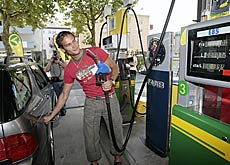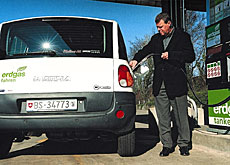Green petrol fuels heated debate

The first pump serving a new environmentally friendly fuel, that emits 80 per cent less carbon dioxide than conventional petrol, has opened in Switzerland.
But questions have been raised about the viability of the new ethanol-based E85 because of low current demand and uncertainty over how much energy is needed to produce the fuel.
Petrol supplier Agrola unveiled its first E85 pump in Winterthur, canton Zurich, on Thursday and plans to open a dozen more around Switzerland in the next 12 months.
E85 has been heralded by producer Alcosuisse, the commercial arm of the state-run Swiss Alcohol Board, as a potential answer to global warming.
It is a mixture of 85 per cent alcohol fermented from vegetable matter and wood chips and 15 per cent conventional petrol. A litre of E85 costs SFr1.39 ($1.12), 20 per cent less expensive than lead-free petrol.
But environmental group Greenpeace Switzerland is less convinced that the new bio-fuel will solve climatic problems.
“We think in principle this is a good approach, but a number of questions remain unanswered,” spokeswoman Sibylle Zollinger told swissinfo.
“This fuels requires a lot of energy to produce and distribute. Switzerland cannot produce large quantities of the biomass required to make E85 so it would need to be brought in from abroad, using even more energy.
“First we must exhaust the potential to economise fuel usage and produce more ecological cars.”
Swedish car manufacturers Saab will introduce a new model that uses E85 on the Swiss market this autumn. Ford is set to follow, but there will only be an estimated 40 such cars on the road in Switzerland by the middle of next year.
No demand
Agrola director Stefan Feer admitted the company is taking a risk by investing money in a project with no clear demand at present.
“If you look at the petrol station in Winterthur in purely economic terms it is not worth it at the moment,” he told swissinfo.
“But we forecast that the Swiss consumer will like the idea of ethanol and will be happy that there is an alternative on the market.”
Feer added that while it is relatively easy to track the price of oil it is difficult to predict the cost of producing the ethanol fuel.
“The price difference between ethanol and conventional petrol could narrow in time because biomass is becoming more expensive globally. Margins are already quite tight and it could get worse,” he said.
Parliament will soon debate whether to reduce or even eradicate tax on bio-fuels that currently attracts the same 73 cent a litre levy as other fuels.
Alcosuisse director Pierre Schaller said a continuation of this tax would quash plans to build a new manufacturing plant in Switzerland to raise production capacity to 50 million litres of E85 annually from the current eight million litres.
“We cannot make this investment unless the politicians make the right decision. Without this concession E85 stands no chance,” he told swissinfo.
“However, I remain utterly convinced that E85 is the way of the future in Switzerland.”
swissinfo, Matthew Allen in Winterthur
According to Saab, the average driver motors 15,000km a year, using 1,350 litres of conventional gasoline.
A Biofuel car would use 1,755 litres of E85, containing 263 litres of conventional fuel, in the same period.
This would save 1,087 litres of environmentally harmful petrol.
Vehicles in Switzerland currently consume 65% petrol, 34% diesel and 1% other fuels.
The average price for unleaded petrol is now SFr1.79, SFr1.83 for premium unleaded, and SFr1.80 for diesel – higher than at any other time.
The US has announced it wants bioethanol to make up 10% of all car fuel consumption by 2010. Bioethanol fuel in Spain already accounts for 3% of the total consumption.
Bio fuels contributed 0.3% of total energy consumption in European Union countries in 2003, which rose to 2% last year. The EU wants to raise that level to 5.75% by the end of 2010.
France has the more ambitious goal of consuming 7% bio fuels in 2010 and 10% in 2015.

In compliance with the JTI standards
More: SWI swissinfo.ch certified by the Journalism Trust Initiative











You can find an overview of ongoing debates with our journalists here . Please join us!
If you want to start a conversation about a topic raised in this article or want to report factual errors, email us at english@swissinfo.ch.